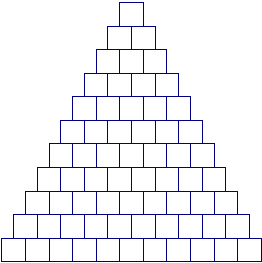Pascal Triangle Related Problems
Contents
The Triangle
Here are lines zero through eight of Pascal's triangle:
Row 0: 1 1: 1 1 2: 1 2 1 3: 1 3 3 1 4: 1 4 6 4 1 5: 1 5 10 10 5 1 6: 1 6 15 20 15 6 1 7: 1 7 21 35 35 21 7 1 8: 1 8 28 56 70 56 28 8 1
Introductory
Problem 1
Given ![]() , find:
, find:
- The coefficient of the
 term.
term. - The sum of the coefficients.
Solution
1. You need to find the 6th number (remember the first number in each row is considered the 0th number) of the 10th row in Pascal's triangle.
The 10th row is:
1 10 45 120 210 252 210 120 45 10 1
Thus the coefficient is the 6th number in the row or ![]() .
.
This can also be found using the binomial theorem:
Through the summation, the binomial theorem will provide you with the coefficient if each term of the result. In our particular case, we are only looking for the coefficient of the ![]() term.
term.
Since you are looking for ![]() term in
term in ![]() , then
, then ![]() and
and ![]() .
.
So the coefficient of the ![]() term is
term is  .
.
2. Since all the coefficients are found in the 10th row, we simply need to add the numbers in the 10th row together. This can be done by hand since there are relatively few numbers, but we could also use the following formula to sum up the numbers:
This summation formula simply adds up all the coefficients since ![]() gives us each of the coefficients. So, the sum is
gives us each of the coefficients. So, the sum is ![]() .
.
For your information, the final polynomial which results from ![]() is
is ![]()
![]()
Intermediate
Problem 1
In Pascal's Triangle, each entry is the sum of the two entries above it. In which row of Pascal's Triangle do three consecutive entries occur that are in the ratio ![]() ?
?
Problem 2
A triangular array of squares has one square in the first row, two in the second, and in general, ![]() squares in the
squares in the ![]() th row for
th row for ![]() With the exception of the bottom row, each square rests on two squares in the row immediately below (illustrated in given diagram). In each square of the eleventh row, a
With the exception of the bottom row, each square rests on two squares in the row immediately below (illustrated in given diagram). In each square of the eleventh row, a ![]() or a
or a ![]() is placed. Numbers are then placed into the other squares, with the entry for each square being the sum of the entries in the two squares below it. For how many initial distributions of
is placed. Numbers are then placed into the other squares, with the entry for each square being the sum of the entries in the two squares below it. For how many initial distributions of ![]() 's and
's and ![]() 's in the bottom row is the number in the top square a multiple of
's in the bottom row is the number in the top square a multiple of ![]() ?
?
Olympiad
See Also
This article is a stub. Help us out by expanding it.












